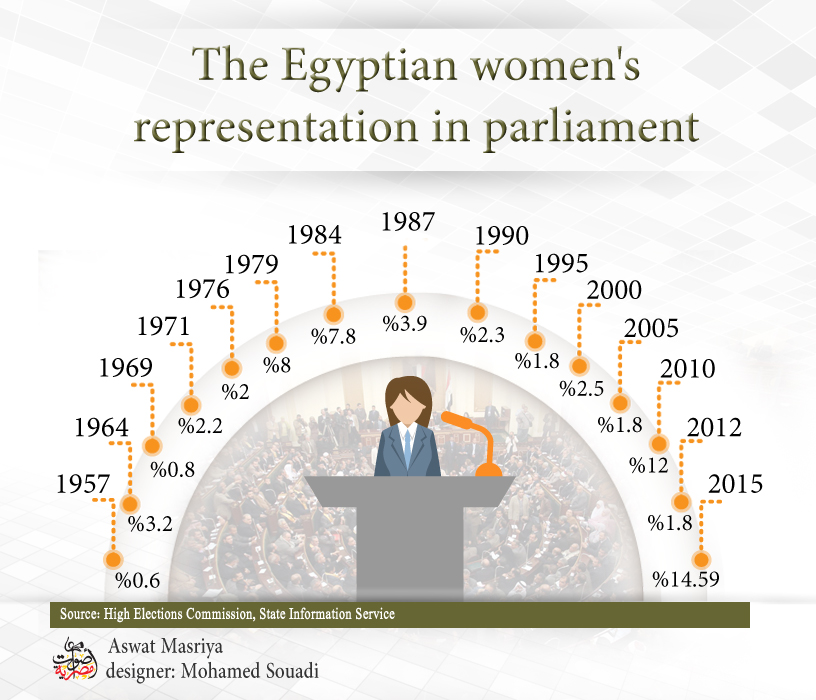Latest NEWS
- Aswat Masriya, the last word
- Roundup of Egypt's press headlines on March 15, 2017
- Roundup of Egypt's press headlines on March 14, 2017
- Former Egyptian President Hosni Mubarak to be released: lawyer
- Roundup of Egypt's press headlines on March 13, 2017
- Egypt's capital set to grow by half a million in 2017
- Egypt's wheat reserves to double with start of harvest -supply min
- Roundup of Egypt's press headlines on March 12, 2017
In numbers: Egyptian women in parliament throughout history

Infograph of Egyptian women representation in parliament - Aswat Masriya
Written by Rahma Diaa
CAIRO, Dec. 31 (Aswat Masriya) - Women's share in parliament rose 14.59% of the seats, the highest share of women in the history of the Egyptian parliament, after Thursday's presidential appointment of 28 members, including 14 women.
The total number of seats now held by women in the House of Representatives is 87 out of 596 seats.
President Abdel Fattah al-Sisi issued a presidential decree Thursday appointing 28 parliamentarians. Another decree was issued setting the first parliamentary session for Jan 10.
According to a recent study conducted by the Inter-Parliamentary Union and UN Women, the share of women in parliament has been on the rise every year.
Egyptian women's share in parliament
Egyptian women were first granted the right to run for parliament by virtue of a presidential decree in 1956, in accordance with the constitution adopted in the same year.
Egyptian women were the first among Arab women to be granted such a right.
In 1957, two women won seats in the parliament, representing the Giza and Alexandria provinces. Women's share later rose to eight seats in 1964, with 3.2% of the seats allocated to women.
Allocating seats for women (quota)
The elections law, as amended in 1979, introduced the quota system which allocated 30 seats for women as a minimum requirement, with the remaining seats available for both women and men for election.
In 1979, 200 women contested and 33 won parliamentary seats. Late president Anwar al-Sadat appointed two more women, which brought the total to 35 women lawmakers, accounting for 8% of seats.
In 1984, the system of proportional representation was introduced thus broadening the quota, resulting in the presence of 36 women out of 458 members in parliament, reducing women's share to 7.8%. In theory, proportional representation is considered an advantage for marginalised groups in society, which include women.
In the following elections, the quota was cancelled and the drop was more pronounced. Women only made up 3.9% of lawmakers in 1987, when 14 female contenders won seats and four were appointed.
However, with the return of the individual system in 1990, only 10 seats were secured by women out of 454 seats, which represented only 0.22% of all lawmakers.
The quota was reinstated in 2010, guaranteeing 64 seats, but women were unable to win any additional seats.
In 2012, the quota was lifted and female representation in parliament was less than 2 percent despite a record number of candidates that exceeded 900.
Parliament of 2015
In the parliamentary elections of 2015, which took place during October and November, women garnered 73 seats, while 14 were appointed by the president, leading to an unprecedented total of 87 seats in parliament.
Among the 73 elected seats, 56 were elected through the electoral lists and 17 won individuals seats.
The House is comprised of 596 members, 448 are individual candidates, 120 elected through lists and 28 appointed by the president.
Increase in women's share
Executive Director of the "Our Right" association Ahmed Abo al-Magd told Aswat Masriya that the electoral system plays an more important role in determining the representation of women in parliament.
According to Abo al-Magd, the quota and the proportional representation system increases the chances of women in parliament.
The Egyptian constitution stipulates an "appropriate" representation of women in parliament, which Abo al-Magd views as an "elastic and unclear" description, compared to the Moroccan constitution which divides parliamentary seats equally between men and women.
Abo al-Magd also pointed to the significance of media and education with regards to their role in influencing the mindset and attitude of Egyptians towards the role of women and their representation in parliament.
(This article was translated into English by Nourhan Fahmy.)










